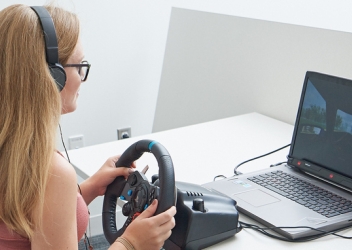Improve Teen Driver Behaviors
Research Projects
- Driving Analytics: Comparison of Teen and Adult Naturalistic Car-following Patterns
This study identified the specific predictors of crashes and near crashes among young drivers and determined if these predictors vary across age and skill level using the Strategic Highway Research Program 2 (SHRP2) naturalistic dataset.
Read more about the research.
Principal Investigators: Helen Loeb, PhD; Thomas Seacrist, MBE
Funding: Center for Child Injury Prevention Studies (CChIPS)
- Machine Learning Techniques: Online Prediction of Driving Behavior and Generation of Customized Feedback via Machine Learning Models
Machine learning is an analytic technique that shows promise in providing algorithms to help predict and manage certain teen driver behaviors that can contribute to crash risk, including speed management. In this multi-year study, researchers successfully created a mechanism to receive real-time data from a driving simulator to train machine learning models using this data to make predictions of teen driver behaviors. They were also able to provide feedback about speed management to teen drivers while in the simulator.
The researchers are continuing to analyze the data to help inform the development of interventions to help teen drivers develop crucial speed management skills. The mechanism they created also shows great promise in preventing teens from engaging in other dangerous driving behaviors via personalized feedback models.
Read a blog post about the research.
Principal Investigators: Yi-Ching Lee, PhD; Santiago Ontañón, PhD
Funding: Center for Child Injury Prevention Studies (CChIPS)
- Cell Phone Use While Driving: A Pattern of Risk in Young Novice Drivers
Research examining cell phone bans has shown mixed results on their effectiveness. This could be due to variations in the types of laws and how effectiveness is measured. Drivers who text while driving may also take other risks that contribute to crashes, such as ignore speed limits. These patterns of risk-taking may be attributable to an underlying individual characteristic or trait and should be studied further so that we can predict those at risk and begin to develop tailored interventions.
Read a blog post about the research.
Principal Investigator: Elizabeth Walshe, PhD
Funding: U.S. National Institute on Drug Abust (RO1 DA 18913); Center for Injury Research and Prevention at Children's Hospital of Philadelphia














